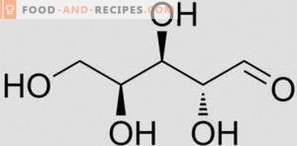
During serious problems with the endocrine system and, in particular, in diabetes mellitus, people are advised to minimize the use of foods that contain glucose. This monosaccharide is not absorbed by the body and contributes to an increase in blood sugar levels, which, in turn, can lead not only to disruption of body functions, but also to death. It is for this reason that today a huge number of various glucose substitutes have been created, which include fructose.
The beneficial properties of fructose
This natural monosaccharide, as it is easy to understand from the name, is of vegetable origin and is found in fruits, as well as in some vegetables and in honey. Its effect on the human body in comparison with glucose can be called softer and sparing. Thus, when ingested into the gastrointestinal tract, products containing fructose do not cause such intense insulin production. It is for this reason that fructose is increasingly used as a sweetener, replacing the sugar we are used to. This is not surprising, because by their taste these products are almost indistinguishable. However, fructose has many advantages, thanks to which it enjoys well-deserved respect not only for diabetics, but also for those people who truly care about their own health.
To begin with, fructose, unlike sugar, is a rather low-calorie product. Therefore, it is not surprising that when eating fruit, many people easily part with extra pounds, while sweets or biscuits that are rich in glucose lead to excessive fullness. It has also been proven that fructose does not cause tooth decay, and for this very reason today it is increasingly being added to the composition of chewing gum. However, it is enough to remember what properties fresh apples or oranges have, and how beneficial they affect the gums and teeth, clearing them from excess food and the characteristic bacterial plaque. Chewing gum with fructose, designed to neutralize harmful microorganisms, has similar properties. Among the advantages of fructose should be called its ability after being released into the liver to transform into glycogen - a polysaccharide, which is responsible for muscle tone. Its presence in the body allows you to get rid of physical fatigue, so fructose is very useful for people who lead an active lifestyle or constantly experience increased physical exertion. It should also be noted that this natural product has one more unique property, which is the ability to neutralize alcohol in the blood. It is not surprising that with a pronounced hangover syndrome, fresh fruit is not only well absorbed by the body, but also helps to get rid of unpleasant symptoms - nausea, headache and dry mouth.
Harm of fructose and contraindications
Of course, the benefits of fructose are difficult to overestimate, especially when it comes to people for whom the use of sugar in its pure form is absolutely contraindicated. However, this type of monosaccharide is not nearly as safe as it seems at first glance. 100 g of fructose contains only 400 kilocalories, so it cannot directly harm the figure. However, lovers of fresh fruit are often overweight. The fact is that it is fructose that activates the processes of digestion and speeds up the processing of substances that enter the gastrointestinal tract. As a result, even after a hearty meal, after which fruit is served for dessert, very soon, any person begins to feel hunger. Meanwhile, the calories consumed do not disappear anywhere, and fats are not neutralized. Therefore, succumbing to the temptation and satisfy hunger, you can gain excess weight in a short time, and fructose is indirectly to blame for this. Numerous studies of this monosaccharide have shown that it is a fairly strong natural allergen. Therefore, even in people with a good immune system, the abuse of foods that contain fructose can lead to itchy skin, runny nose, and even asthma. The worst thing is that only once having gone too far with fructose, such people will have to subsequently abandon their favorite fruits and vegetables once and for all, to which their bodies will henceforth react in such an inadequate manner. In addition, it has been proven that excess fructose in the body can lead not only to an imbalance in the energy balance, but also to malfunction of the cardiovascular system. And experiments conducted on mice, confirmed the hypothesis that excessive consumption of foods that contain fructose, leads to premature aging of the whole organism.











































